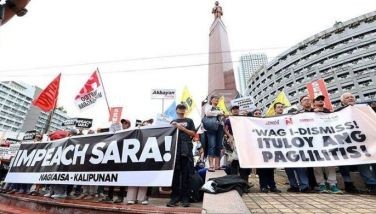Massive energy shortage feared
January 29, 2001 | 12:00am
The country will face another massive power shortage in the next three to five years if the government pursues its plan of scrapping the controversial Omnibus Power Sector Reform (OPSR) bill.
Sources in the energy sector said the scrapping of the OPSR would result in the withholding of the release of multilateral loans that would fund various power projects in the country.
"Depending on the growth demand, the country will be faced with a huge power problem starting from 2004 to 2006," the source said, requesting anonymity.
Among the projects to be funded by these loans is the Leyte-Mindanao interconnection, a "transmission highway" that would make low-cost power available in most parts of the country.
Without this project, the government would have to put up three more power plants in Mindanao to sustain its power needs.
"At this point, without the power bill, the government has to shoulder the expenses of running the power plants of Napocor," the source said.
The source said the government may opt to finance these projects through build-operate-transfer (BOT) deals but, the source added, this may turn out to be more expensive.
The government needs at least P1 billion a year to support its power generation projects, the source added.
The Cabinet decided the other day to shelve the OPSR bill reportedly because its passage would yield only P5 billion but the government would have to spend P10 billion to implement it.
But the sources said the scrapping of the OPSR bill would also bloat the budget deficit by about P50 billion (or about $1 billion) because releases of several power loans hinge on the passage of the bill.
Threatened are the loans from the Asian Development Bank (ADB), World Bank (WB) and Japan Bank for International Cooperation (JBIC), the source added.
"With this decision, the budget gap could reach P190 billion," the source said, or some P60 billion over the P130-billion target set for this year.
The state-owned National Power Corp. (Napocor) is also expected to fall into technical default with these international creditors because Napocor has been using the OPSR bill as the excuse for failing to comply with its loan covenants.
About 60 percent of the total P6.5 billion in Napocor loans came from ADB, WB and JBIC. "This means that about $3.6 billion to $4 billion would be declared in technical default," the source added.
Napocor, in asking for a waiver from its creditors, said the passage of the OPSR bill would help the firm comply with the return-on-rate base (RORB), or minimum profit margin, and debt service ratio (DSR) required by the creditors.
The creditors require an RORB of eight percent from the current three percent and a DSR of 1.3 percent from the current DSR if below one percent.
The Napocor also asked for a deferment of its quadrennial asset valuation because it had expected privatization to take effect within the next 18 months.
Sources in the energy sector said the scrapping of the OPSR would result in the withholding of the release of multilateral loans that would fund various power projects in the country.
"Depending on the growth demand, the country will be faced with a huge power problem starting from 2004 to 2006," the source said, requesting anonymity.
Among the projects to be funded by these loans is the Leyte-Mindanao interconnection, a "transmission highway" that would make low-cost power available in most parts of the country.
Without this project, the government would have to put up three more power plants in Mindanao to sustain its power needs.
"At this point, without the power bill, the government has to shoulder the expenses of running the power plants of Napocor," the source said.
The source said the government may opt to finance these projects through build-operate-transfer (BOT) deals but, the source added, this may turn out to be more expensive.
The government needs at least P1 billion a year to support its power generation projects, the source added.
The Cabinet decided the other day to shelve the OPSR bill reportedly because its passage would yield only P5 billion but the government would have to spend P10 billion to implement it.
But the sources said the scrapping of the OPSR bill would also bloat the budget deficit by about P50 billion (or about $1 billion) because releases of several power loans hinge on the passage of the bill.
Threatened are the loans from the Asian Development Bank (ADB), World Bank (WB) and Japan Bank for International Cooperation (JBIC), the source added.
"With this decision, the budget gap could reach P190 billion," the source said, or some P60 billion over the P130-billion target set for this year.
The state-owned National Power Corp. (Napocor) is also expected to fall into technical default with these international creditors because Napocor has been using the OPSR bill as the excuse for failing to comply with its loan covenants.
About 60 percent of the total P6.5 billion in Napocor loans came from ADB, WB and JBIC. "This means that about $3.6 billion to $4 billion would be declared in technical default," the source added.
Napocor, in asking for a waiver from its creditors, said the passage of the OPSR bill would help the firm comply with the return-on-rate base (RORB), or minimum profit margin, and debt service ratio (DSR) required by the creditors.
The creditors require an RORB of eight percent from the current three percent and a DSR of 1.3 percent from the current DSR if below one percent.
The Napocor also asked for a deferment of its quadrennial asset valuation because it had expected privatization to take effect within the next 18 months.
BrandSpace Articles
<
>
- Latest
- Trending
Trending
Latest
Trending
Latest
Recommended





























